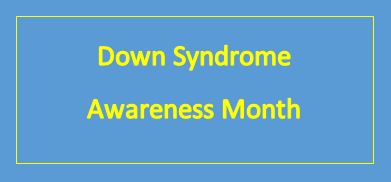October is Down Syndrome Awareness Month so I wanted to share some information that you may already know, and some information that might be new to you.
Down syndrome occurs when an individual has a full or partial extra copy of chromosome 21. There are three types of Down syndrome: trisomy 21 (nondisjunction), which accounts for 95% of cases; translocation accounts for about 4%, and mosaicism accounts for about 1%. As a result of this extra copy of chromosome 21, certain genes on chromosome 21 are over-expressed, which can impact an individual in various ways, including physical appearance, development, and health.
- A 35 year old woman has about a one in 350 chance of conceiving a child with Down syndrome, and this chance increases gradually to 1 in 100 by age 40.
- One in every 772 babies in the United States is born with Down syndrome (about 5,100/year).
- Some common physical characteristics to a person with Down syndrome are an upward slant to the eyes, a larger gap between the big toe and the other toes, low muscle tone, and shorter stature, just to name a few.
- There is an increased risk for certain medical conditions, such as heart defects, childhood leukemia, hearing problems, vision problems, thyroid conditions, dental problems, and Alzheimer’s disease.
- Some common developmental concerns are neurological and cognitive differences, intellectual delays, speech deficits, memory impairment, and a higher prevalence of autism spectrum disorder than in the typical population.
- People with a diagnosis of Down syndrome are unique individuals just like you and I and should be referred to as a person first and their diagnosis second. Instead of “Down syndrome child,” it should be “a child with Down syndrome” or “a child with a diagnosis of Down syndrome.” Note – verbiage like “Down’s child” and describing the condition as “Down’s,” as in, “He has Down’s” does not represent the person first.
- They are not always happy. They do have the same feelings and emotions as others.
- People with Down syndrome can go to school, play sports, work jobs, own a business, live on their own, get married, and have very fulfilling lives.
Having personal experience with my son, I can say he is so much more than all of the above. He is smart, caring, funny, sweet, forgiving, and a joy to be around. Our life is better having him in it!
I hope sharing these few things gave you a little more knowledge and understanding.
Thank you for being on this journey with us, shedding a different light on disabilities!
Information above has been shared from the CDC, National Down Syndrome Society, and the Down Syndrome Resource Foundation websites.
1 Cor 12:22-27
#specialneeds #specialneedsmamas #specialneedskids #inclusion #createdforapurpose #differentnotless
